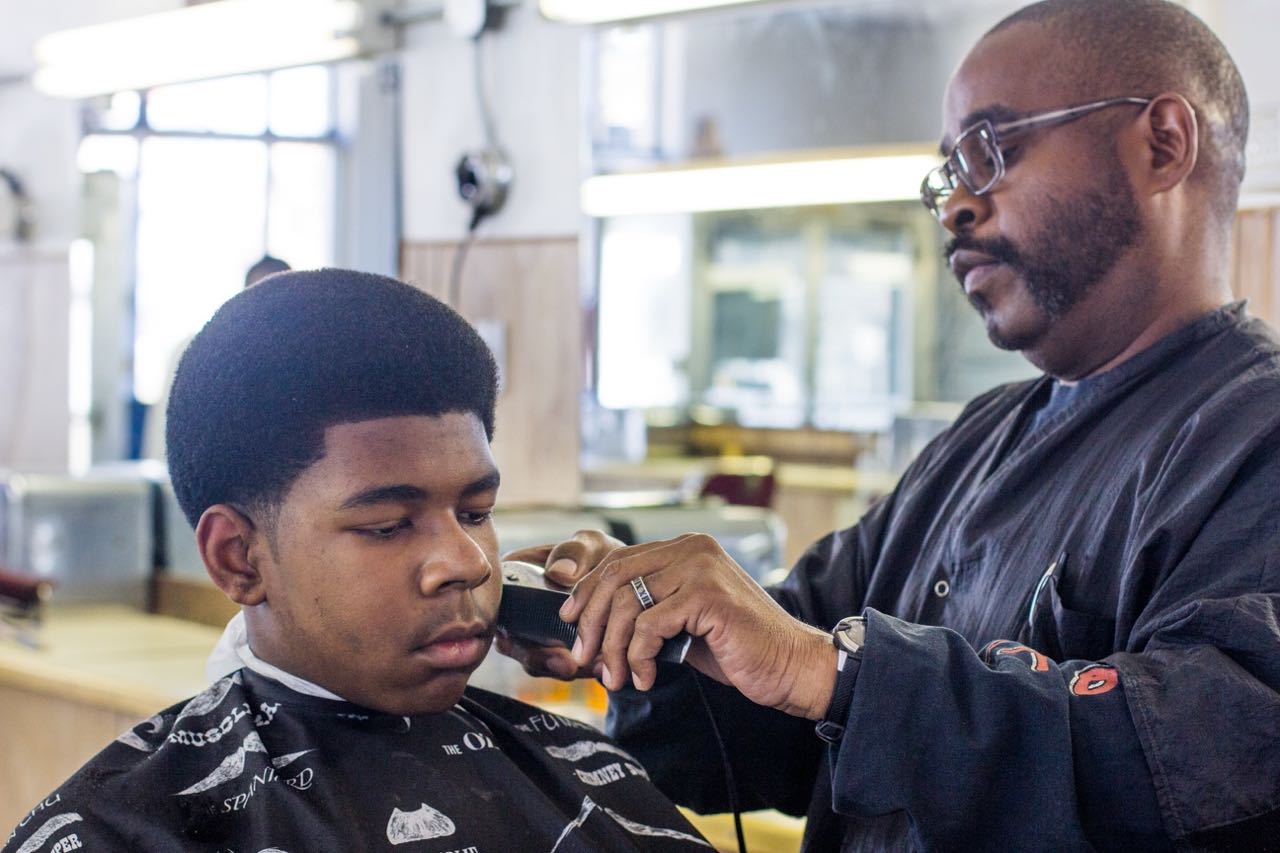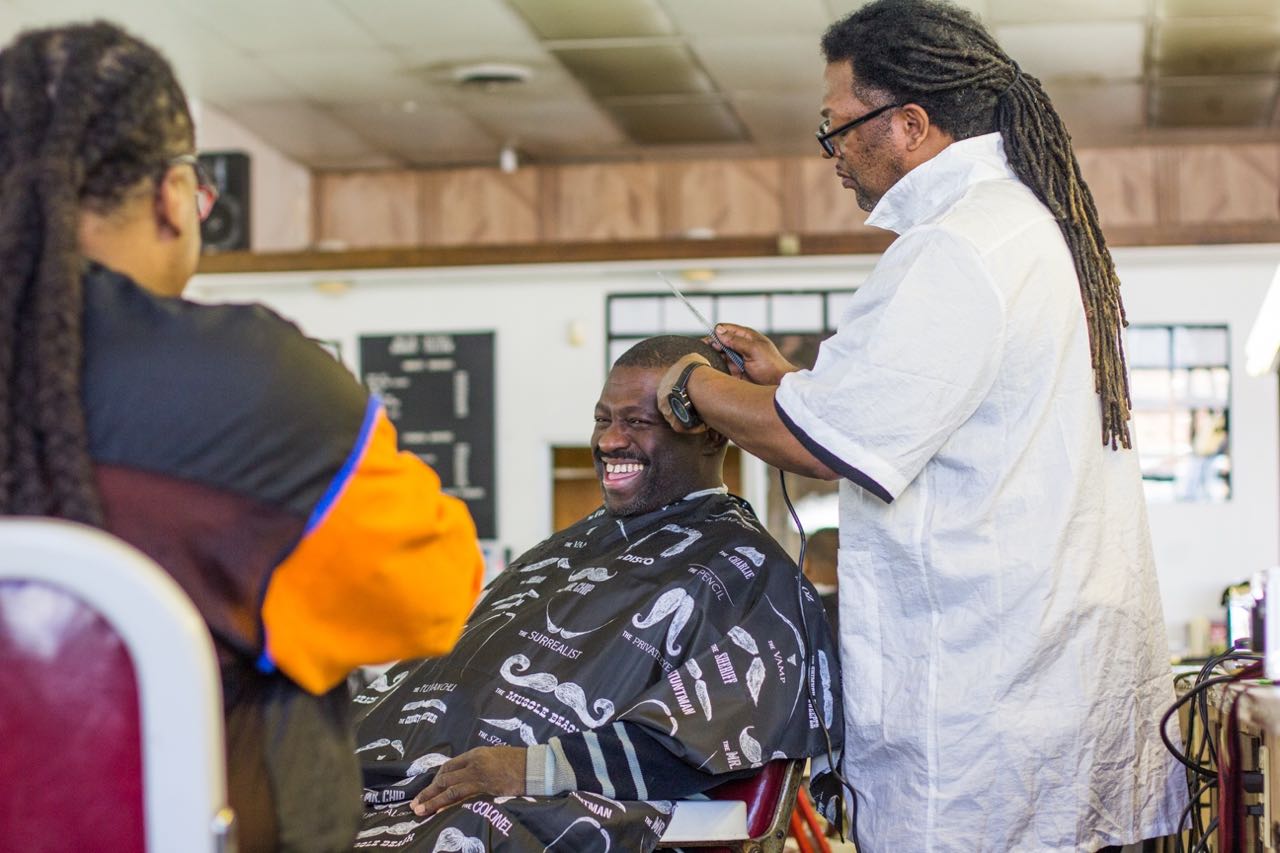Metro Detroit Barber College is both bridge and sanctuary in a changing Detroit
Terryn Hall |
Monday, December 05, 2016
A barbershop is more than just a place to get a haircut—it represents renewal, rejuvenation, revitalization. A person can come in, sit in a chair, and for 30 minutes tune out the cares of the world. For the customers and students of the Metro Detroit Barber College, it's also a place where people from the neighborhood and across the city can get a good cut at a low price with good company.
Located on a stretch of McNichols Road between the University of Detroit Mercy and Marygrove College, the Metro Detroit Barber College is owned and operated by Raymond Ware, a Live6 Alliance member who bought the property over 20 years ago. It's situated at the edge of Fitzgerald, a neighborhood that, according to Statistical Atlas, has a median income of about $22,100—less than Detroit's overall median income ($26,300) and far less than the nearby neighborhood of University District ($88,000).
Change is all but guaranteed, as the mayor's office has targeted Fitzgerald for intensive development and has solicited requests for proposal from developers on how to reimagine the neighborhood. The Metro Detroit Barber College, then, is a bridge between Fitzgerald's past and the neighborhood's future.
Old meets new
Walking into the Barber College feels like entering a time machine. During the week a cut is $5.00, $6.00 on Saturday—prices that seem more appropriate in the 1970s. Deep burgundy and wrought iron barbers chairs are bolted in front of large mirrors and lend the shop a vintage air. At the end of the counter, a lather machine perches for the next person to use for a straight razor shave.
Ware first ran the business as a barbershop before turning it into a barber college. His father, Raymond Jackson Ware, helped with the build out. "He did everything except electrical and plumbing," Ware says.
 Lucas, 13, getting his hair cut by Metro Detroit Barber College owner Raymond Ware
Lucas, 13, getting his hair cut by Metro Detroit Barber College owner Raymond Ware
Being creative during the development process was imperative to the bottom line. When the $200 price for UV sanitizers proved prohibitive, Ware's father created the Bread Box, a custom sanitizer made from metal bread boxes, exclusively for the Barber College. Built with the same specifications as typical sanitizers but with an additional shelf and infinitely more style, the Bread Boxes are popular with students and add a nostalgic flair to the space.
While the Barber College has a distinct old-school charm, newness shows up in unexpected ways. Instead of clocking in using a punch card or even a computerized keypad, students use a biometric fingerprint machine. And though he still teaches about hair processing methods like relaxers, stylistic changes are inevitable for customers.
The biggest one Ware says he's seen in the past few years? "Oh, the young guys just not cutting their hair," he says. Younger customers may get a line-up, but they're letting the top parts of their afros go free. Classic styles remain, though. "Fade, tapers, they've been around forever and I think they'll be around forever too."
Fitzgerald hustles harder
Detroiters are known for their grit and hustle. James Simon is no different. A native Detroiter and barber student who's been cutting hair since he was 13, Simon is now 38 and pursuing his barber's license at the Barber College after serving in the Marine Corps.
"With that license it opens you up within the field to do other things as opposed to just cutting hair," says Simon. He's been with the Metro Detroit Barber College for a year, and is looking to patent an idea for specialized barbering equipment. He's keeping the idea under wraps, but saw a need that wasn't currently being met and petitioned the United States Patent Office about it. His next step is to develop his product and a prototype.
Metro Detroit Barber College students aren't the only ones with hustle. Maurice Reed is an instructor at the college as well as a groomer of thoroughbred horses. He has long, neatly braided locs that cascade down his back.
 Barber student (in white) prepping to cut a customer's hair as instructor Maurice Reed looks on
Barber student (in white) prepping to cut a customer's hair as instructor Maurice Reed looks on
Reed got his start in 1988 hot-walking horses—a cool down walk after the race ends—and has been at it ever since. "I juggle my grooming job with the horses. I start at 4:30 in the morning, and get done in enough time to make it here by noon. I stay here til 5:00," he says.
"I enjoy grooming because when it works, when you're doing right, it's going to work. And if you're cheating, meaning, 'I'm slacking, I didn't put as much time into his leg work as I should have,' so it shows. And if that happens, then the horse won't run well. But if you do everything you're supposed to do, your horse will run well. It's simple. Just like my students—if they listen to what I'm telling them, it'll be all good."
Its own type of anchor institution
Richard Nelson is a customer that lives close by, and has been coming to the Barber College for more than five years for his grooming needs. "It's a ton of wealth and wisdom here," he says.
Nelson sees the ongoing development in the neighborhood and Detroit as an overall positive thing. "It was hard times for twenty years, now it's time for it to revitalize itself and be the city it once was. At one time it was one of the top five cities in the United States, or maybe the world. It's great housing here, great people here, great businesses."
Aside from being a barbershop, the Metro Detroit Barber College is also one of the few businesses on the McNichols corridor that serves as sanctuary for community members to gather. It is its own type of anchor institution—a place where new barbers can learn but also a place where nearby neighbors feel comfortable coming in, taking care of themselves, and connecting with others.
This story is part of Model D's "On the Ground" series, which gives voice to the community members, businesses, and developers who make the Live6 neighborhood come alive. Support for this series is provided by the Kresge Foundation.
All photos by Bree Gant.